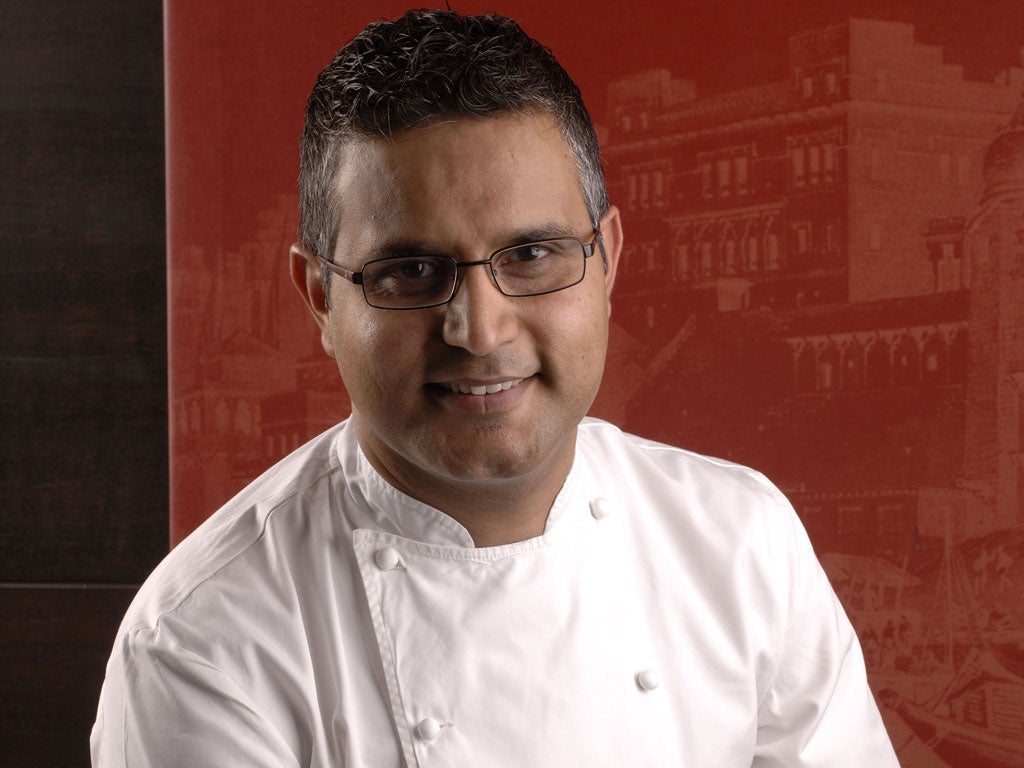My Life In Food: Atul Kochhar
'I love cheap cheese slices, but I wouldn't feed them to my family'

Your support helps us to tell the story
From reproductive rights to climate change to Big Tech, The Independent is on the ground when the story is developing. Whether it's investigating the financials of Elon Musk's pro-Trump PAC or producing our latest documentary, 'The A Word', which shines a light on the American women fighting for reproductive rights, we know how important it is to parse out the facts from the messaging.
At such a critical moment in US history, we need reporters on the ground. Your donation allows us to keep sending journalists to speak to both sides of the story.
The Independent is trusted by Americans across the entire political spectrum. And unlike many other quality news outlets, we choose not to lock Americans out of our reporting and analysis with paywalls. We believe quality journalism should be available to everyone, paid for by those who can afford it.
Your support makes all the difference.Atul Kochhar began his career working in hotel kitchens in India in the early 1990s. By 1994 he had upped sticks and moved to London, where he opened Tamarind. It received a Michelin Star in 2001. He went on to get another star for his next and current restaurant, Benares. He is now a regular on TV and his new book, Curries of the World, is out in spring. He is mostly to be found in his kitchen.
What are your most and least used pieces of kitchen kit?
I would say a wok. You can do so many things with them. You can braise things, sauté, fry and roast things. I do a lot of tea smoking in mine. You put your smoking material in the base, with the charcoal infused with tea and spices, then put a mesh on top with your meat on it, then seal the wok and heat. It is great – the flavour is wonderful. One thing I don't use is my refractometer, which basically measures the sugar in any solution. I thought it would be useful for making sorbets, to have an exact formula for perfection, but my customers complained and said: "Go back to the old way." Cleverly marketed, that thing was.
If you had only £10 to spend on food, where would you spend it and on what?
I would go to a market. If I had the world, I'd go to Thailand for fruit – it is amazing there, you can get everything, from the very mundane to the most exotic. There is no better place in the world, I think. Istanbul would be my choice for fish. And if I wanted meat, then it would be to a market here in London. I could spend my £10 in any of those places and be happy.
What do you eat for comfort?
Now this is where I get embarrassed. I love my cheese sandwiches, which I have every night. The cheese I use is bought only for me. It is, frankly, below my family. It is £1 for 10 slices of squidgy cheese – which may or may not be something that has been swept from a floor. I just like the simplicity of it – it is a contrast to the food I spend my days making.
If you could only eat bread or potatoes for the rest of your life, which would you choose?
I would have potatoes – they are superior to bread. They are more integral to my cooking and nutritionally they are a better option. Plus bread is bread – without crossing over into rye and malt, you get very similar stuff.
What is your desert island recipe?
Well, it would have to be a marinade for the barbecue that I would be cooking my food on – what else would you do on a desert island? A quick one would be salt, pepper and a lot of garlic and some oil.
What's your favourite restaurant?
I love D.O.M. in Sao Paulo. The chef, Alex Atala, creates his dishes by going to the jungle for 60 days to research herbs and spices. He then goes to his tree house and creates the dishes. He says if the tree house is surrounded by monkeys as he cooks, then the dish is a success; if not, it is a failure.
What's your favourite cookbook?
Nathan Myhrvold's Modernist Cuisine is in five volumes and is incredibly exhaustive. It explores the laboratory-style cooking of modern times – it really interests me. It does, however, cost a small fortune to buy.
Who taught you to cook?
My father. He ran a catering business; he enticed me into the industry. Most of the day-to-day things I do in my cooking comes from him. I have trained with many Michelin-starred chefs, but the methods I use day after day are often, I notice, my father's.
Join our commenting forum
Join thought-provoking conversations, follow other Independent readers and see their replies
Comments